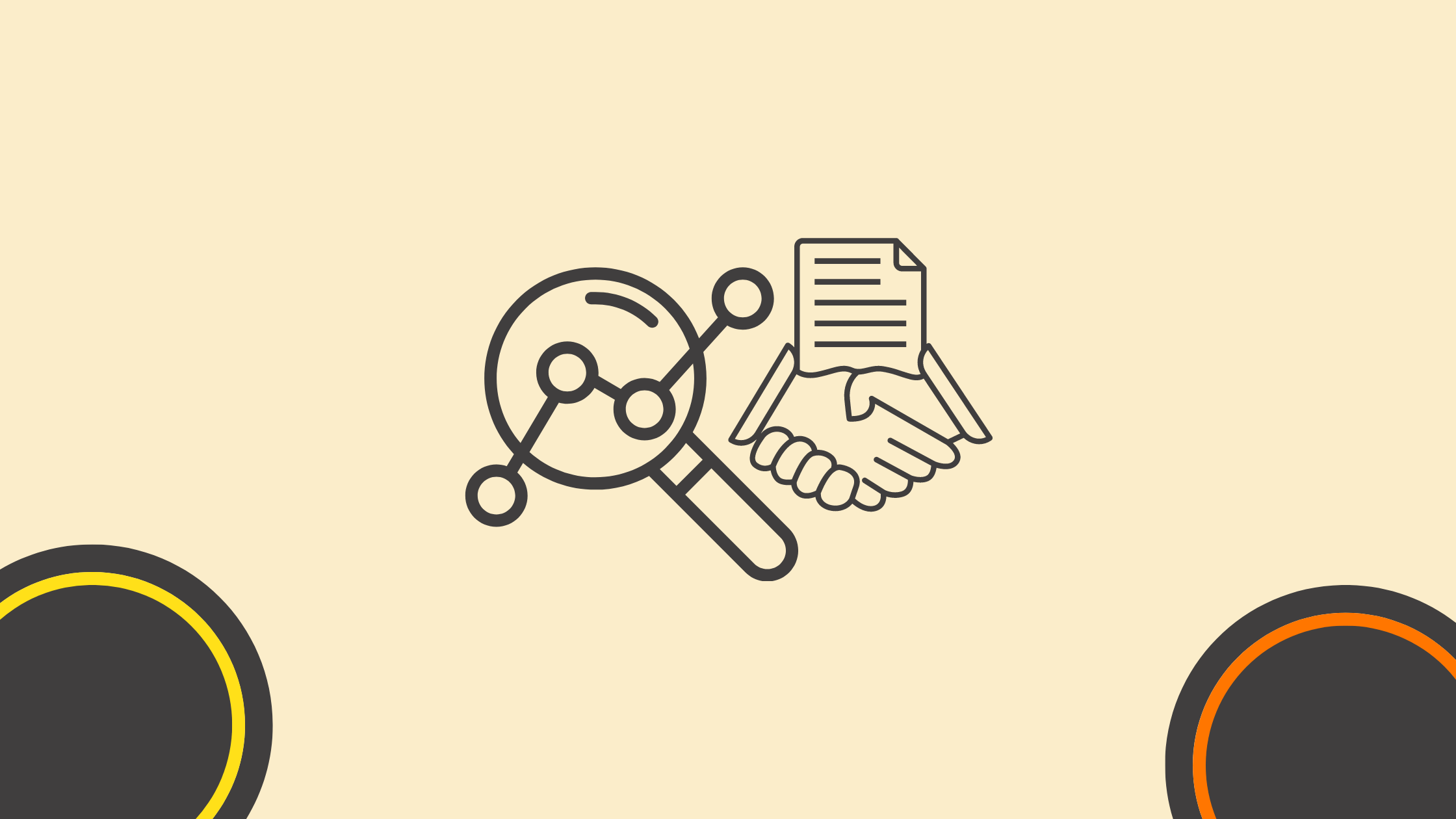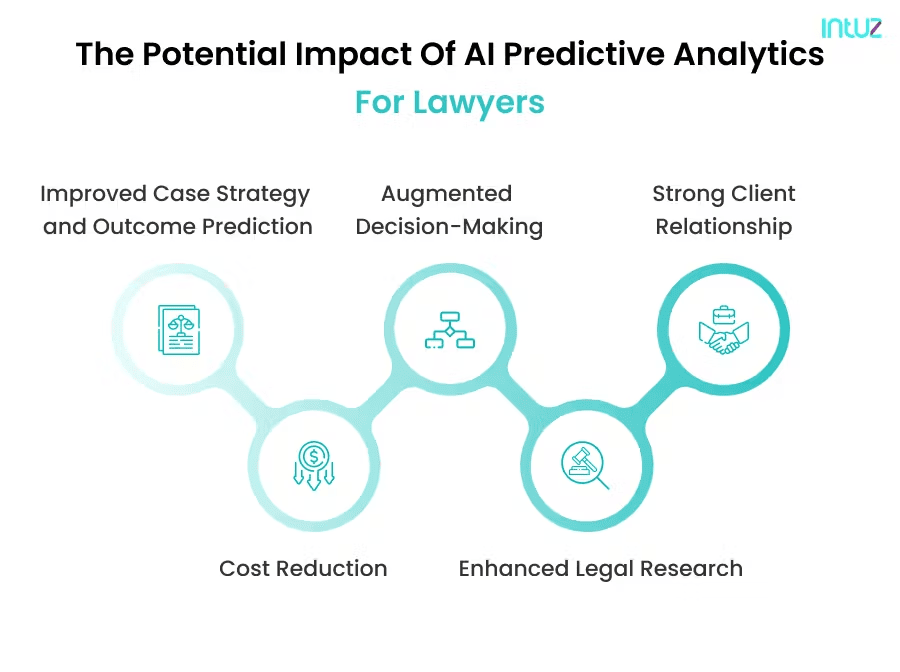Predictive Analytics in Legal Services: The Power of AI/ML
In an era where data drives decision-making across industries, the legal field is no exception. According to Mordor Intelligence, the global market for AI in the legal industry is expected to reach $3.64 bn by 2029. It is a testament to the unlimited potential of AI/ML in the legal industry.
Predictive analytics, powered by AI/ML, is becoming an invaluable tool for legal professionals, offering unprecedented insights and efficiencies.
Unlike traditional methods that rely heavily on manual analysis and historical precedent, predictive analytics uses vast datasets and sophisticated algorithms to forecast outcomes, assess risks, and streamline processes.
This blog post will let you explore how predictive analytics is reshaping the legal landscape, providing actionable insights and a competitive edge to those who embrace its potential.
Chapters
Understanding Predictive Analytics

Predictive analytics refers to the practice of extracting information from existing data sets to determine patterns and predict future outcomes and trends.
In the context of legal services, predictive analytics involves using statistical algorithms and machine learning techniques to analyze historical data, such as past case outcomes, legal precedents, and client interactions. This analysis helps legal professionals
- Forecast case results
- Identify potential risks
- Make informed decisions
Legal documents, including contracts and court filings, provide a wealth of information that can be analyzed for risk assessment and strategy development. Overall, the effective utilization of these data sources through predictive analytics enables legal professionals to make more accurate and strategic decisions.
Predictive Analytics Using AI/ML
Predictive analytics relies on AI/ML in the legal industry. Machine learning algorithms enable systems to learn from data and improve accuracy over time without explicit programming.
Natural language processing allows AI systems to understand, interpret, and generate human language. In the legal field, NLP analyzes and categorizes vast amounts of text from legal documents, contracts, and case law to extract relevant information and insights.
Predictive analytics in the legal field uses various types of data to generate valuable predictions. Key data sources include case law, legal documents, client data, and even social media activity.
By analyzing historical case outcomes, lawyers can identify trends and patterns that may influence the direction of a current case. Client data, such as past interactions and case histories, can help predict client behavior and preferences.
Key Applications of Predictive Analytics in Legal Services

The following legal industry AI applications illustrate how predictive analytics, powered by AI and machine learning in legal analytics, is transforming the legal industry by improving efficiency, accuracy, and strategic decision-making.
Case Outcome Prediction
Predictive models analyze historical case data to forecast the likely outcomes of current cases, helping legal professionals assess the probability of winning or losing.
Examples include AI legal service platforms like Lex Machina and Premonition, which offer case outcome predictions by analyzing vast legal databases.
Legal Research
AI/ML technologies streamline legal research by quickly sifting through large volumes of legal texts and case law to find relevant information.
This significantly reduces the time and costs associated with traditional legal research assistance methods, allowing lawyers to focus on more strategic tasks.
Contract Review and Analysis
Natural language processing (NLP) is used to automate the review of contracts, identifying risks, anomalies, and non-standard clauses.
This leads to greater accuracy, speed, and cost savings in contract review processes.
Litigation Strategy
Predictive analytics helps in developing and optimizing litigation strategies by analyzing patterns and outcomes of similar cases.
Real-world examples demonstrate successful implementation, such as law firms using data-driven insights to decide whether to settle or proceed to trial.
Client Risk Assessment
Historical data is used to predict client behavior and potential legal risks, enabling lawyers to provide better advisory services.
This enhances client relationships by offering data-driven insights and proactive risk management.
Billing and Financial Forecasting
Predictive analytics is used to forecast financial trends and optimize billing practices, ensuring more accurate financial planning and management for legal services.
Benefits of Predictive Analytics in the Legal Industry
Predictive analytics is revolutionizing the legal industry by bringing unprecedented levels of efficiency, accuracy, and strategic insight. Embracing these advanced technologies is essential for legal professionals aiming to stay competitive and provide top-notch service to their clients.

Img src: Google
Enhanced Efficiency
Predictive analytics significantly boosts efficiency by automating repetitive tasks and reducing the need for manual labor.
Legal professionals use AI/ML in the legal industry to sift through vast amounts of data, identify relevant information, and generate insightful reports quickly.
The legal services automation with AI allows lawyers to focus on more strategic aspects of their work, such as crafting legal arguments and advising clients, ultimately streamlining the workflow and increasing overall productivity.
Increased Accuracy
The precision of legal predictions and decision-making is greatly improved through AI-powered legal analytics. AI/ML in legal industry analyze historical data to identify patterns and trends, leading to more accurate forecasts of case outcomes and legal scenarios.
This heightened accuracy aids lawyers in making well-informed decisions, reducing the margin for error and enhancing the quality of legal advice provided to clients.
Cost Savings
Optimized workflows through predictive analytics translate into substantial cost savings for legal firms. By automating routine tasks and improving the accuracy of predictions, firms can reduce the time and resources spent on each case.
This efficiency lowers operational costs, minimizes the need for extensive labor, and reduces the likelihood of costly mistakes, ultimately contributing to a healthier bottom line for legal practices.
Strategic Planning
Predictive analytics legal software empowers legal professionals with data-driven insights, enabling better strategic planning and decision-making.
By analyzing past cases and current trends, lawyers can develop more effective strategies, anticipate potential challenges, and tailor their approach to achieve the best possible outcomes.
This strategic edge is invaluable in complex legal environments where foresight and preparation are crucial.
More Client Benefits
Enhanced client satisfaction is a direct result of more accurate and timely legal advice facilitated by predictive analytics. Clients benefit from the precision and efficiency of AI/ML in the legal industry, receiving more reliable predictions about their cases and faster resolutions.
This improved service quality not only strengthens client relationships but also builds the firm’s reputation for delivering high-caliber legal solutions.
Challenges and Ethical Considerations
The implementation of predictive analytics in legal services offers immense potential but also comes with significant challenges and ethical considerations.
By addressing data privacy and security concerns, mitigating bias in predictive modeling for lawyers, and ensuring regulatory compliance, legal professionals can harness the power of AI/ML in the legal industry responsibly and effectively.
Embracing these best practices is crucial for maintaining trust, fairness, and integrity in the evolving landscape of legal services
Data Privacy and Security
One of the foremost concerns in implementing predictive analytics in legal services is handling sensitive client data and legal documents. The legal industry deals with highly confidential information, and any breach can have severe repercussions.
Ensuring data privacy and security compliance is paramount. Legal firms must adopt robust encryption methods, secure data storage solutions, and strict access controls to protect sensitive information.
Regular audits and adherence to data protection regulations, such as GDPR and CCPA, are essential measures to safeguard client data and maintain trust.
Bias in Predictive Models
Predictive models are only as good as the data they are trained on. One significant risk is the potential for biased predictions due to flawed or unrepresentative data.
If the training data contains biases, AI/ML in the legal industry further perpetuates these biases, leading to unfair outcomes. To mitigate this risk, it is crucial to use diverse and representative datasets and continually monitor and refine the models.
Strategies such as implementing fairness-aware algorithms, conducting regular bias audits, and involving interdisciplinary teams in the model development process can help ensure fairness and reduce bias in predictive analytics.
Regulatory Compliance
Navigating the legal and regulatory landscape for AI/ML in legal industry presents its own set of challenges. Legal professionals must stay informed about the evolving regulations and guidelines that govern the use of AI and predictive analytics.
Adherence to industry standards, such as those set by the American Bar Association (ABA) and other regulatory bodies, is essential.
Legal firms should develop comprehensive compliance frameworks that address ethical considerations, data governance, and accountability in AI/ML applications.
Continuous education and training for legal practitioners on the ethical use of AI/ML technologies can also foster a culture of compliance and responsibility.
Future Prospects and Innovations
By staying ahead of emerging technologies and integrating them into their practices, legal professionals can harness the full potential of predictive analytics, driving innovation and delivering superior client service.
Advancements in AI/ML
Future advancements in AI and machine learning for law firms promise to further enhance predictive analytics in legal services. Emerging technologies like quantum computing and advanced neural networks could significantly improve the accuracy and speed of predictive models.
AI Capabilities
Improvements in AI capabilities, such as deep learning and enhanced natural language processing (NLP), will enable more sophisticated analysis of legal texts, precedents, and complex datasets.
Blockchain Integration
The integration of predictive analytics with blockchain technology can revolutionize contract management and legal transactions. Smart contracts, which execute agreements automatically based on predefined conditions, could be paired with predictive analytics.
Enhanced Legal Tech Ecosystem
Combining predictive analytics legal software with other legal tech solutions, like document automation and case management systems, will create a more cohesive and efficient legal technology ecosystem, driving business & personal growth in the age of AI.
Evolving Legal Practices
Have a look at the following best practices of AI/ML in the legal industry:
- Predictive analytics is set to shape the future of legal practice by enabling data-driven decision-making. Lawyers will increasingly rely on analytics to develop strategies, manage risks, and provide more accurate advice to clients.
- The lawyers’ interactions with clients will evolve, with predictive analytics offering more personalized/proactive services. Clients expect more precise risk assessments, outcome predictions, and tailored legal strategies based on comprehensive data analysis.
- As predictive analytics becomes more integrated into legal workflows, the efficiency and cost-effectiveness of legal services will improve. This will make high-quality legal assistance more accessible to a broader range of clients.
Conclusion
As we stand on the brink of a technological revolution, the integration of predictive analytics in legal services showcases the immense potential of AI/ML in the legal industry to transform traditional practices.
By harnessing these advanced tools, legal professionals can enhance their decision-making capabilities, drive efficiency, reduce costs, and achieve better outcomes for their clients.
The power of AI/ML in the legal industry is undeniable. It offers a glimpse into a future where data-driven insights pave the way for more effective and innovative legal solutions. Connect with top legal AI solutions providers to complete your next project using predictive analytics.
Other Interesting Articles
- AI LinkedIn Post Generator
- Gardening YouTube Video Idea Examples
- AI Agents for Gardening Companies
- Top AI Art Styles
- Pest Control YouTube Video Idea Examples
- Automotive Social Media Content Ideas
- AI Agent for Plumbing Business
- Plumber YouTube Video Idea Examples
- AI Agents for Pest Control Companies
- Electrician YouTube Video Idea Examples
- AI Agent for Electricians
- How Pest Control Companies Can Get More Leads
- AI Google Ads for Home Services
Master the Art of Video Marketing
AI-Powered Tools to Ideate, Optimize, and Amplify!
- Spark Creativity: Unleash the most effective video ideas, scripts, and engaging hooks with our AI Generators.
- Optimize Instantly: Elevate your YouTube presence by optimizing video Titles, Descriptions, and Tags in seconds.
- Amplify Your Reach: Effortlessly craft social media, email, and ad copy to maximize your video’s impact.